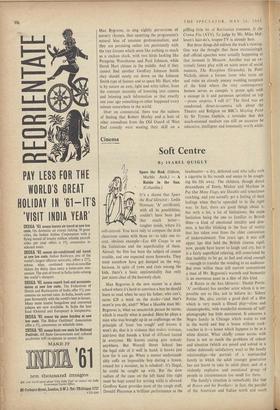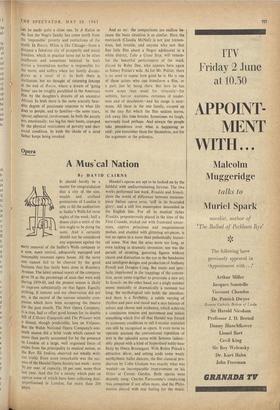Cinema
Soft Centre
By ISABEL QUIGLY Sparc the Rod. (Odeon, Marble Arch.) — A Raisin in the Sun. (Columbia.) IT's a shame that Spare the Rod (director : Leslie Norman; 'A' certificate), with all its possibilities, couldn't have been just that much better— tougher inside, where it's soft-centred. You have only to compare the drab classroom scenes with those in—to take one re- cent, obvious example—Les 400 Coups to see the limitations and the superficiality of these. Already the film has been the subject of censor trouble, and one expected more fireworks. They must somehow have got damped on the way, because, in spite of rows and riots among the kids, there's a basic sentimentality that only just steers clear of the heavenly choir.
Max Bygraves is the new master in a slum school where it's hard to convince a boy he should learn to read when he says his father, who can't, earns £28 a week on the docks—`and that's more'n you do, ainit?' What a likeable man Mr. Bygraves is, what an unactorish person he seems, which is exactly what is needed. Here he plays a man who was brought up in an orphanage on the principle of 'treat 'em rough' and knows it won't do, that it is violence that makes violence, anti-love that breeds a kind of diffused hatred in everyone. He knows caning gets nobody anywhere. But Worrell Street School has the legal side of it well in hand; it knows just how far it can go. When a master understand- ably cuffs an impossible boy during a lesson, roused for a moment, he is rebuked: it's illegal, he could be caught up with. But the slow sadism of the cane on the left hand (the right must be kept sound for writing with) is allowed. Geoffrey Keen provides most of the rough stuff, Donald Pleasence a brilliant performance as the headmaster—a dry, defeated soul who talks with a cigarette in his mouth and seems to be cough- ing his life away. The children, though direct descendants of Doris, Mickey and Marlene in Put Out More Flags, are likeable and sometimes touching, and you actually get a feeling of their feelings when they're appealed to in the right way. In fact, there are good things about it, but with a lot, a lot of limitations; the main limitation being the one so familiar to British films—a kind of emotional timidity and dim- ness, a bat-like blinking in the face of reality that has taken over from the older convention of understatement. Ten years ago, it was stiff upper lips that held the British cinema rigid; now, people have learnt to laugh and cry, but it is a fairly superficial relaxing, still constricted by that inability to let go, to feel and mind enough —enough to transfer the minding to an audience. But even within these still narrow conventions a man of Mr. Bygraves's warmth and humanity is an enormous asset in a film of this kind.
A Raisin in the Sun (director: Daniel Petrie; 'A' certificate) has another actor whom it is im- possible not to like, not to believe in: Sidney Poitier. He, also, carries a good deal of a film which is very much a filmed play—close and claustrophobic, with wonderful moments of 'still' photography but little movement. It concerns a Negro family in Chicago which wants to rise in the world and buy a house without cock- roaches in it—a house which happens to be in a white district. What chiefly comes across with force is not so much the problems of colour and situation (which are posed and solved in a rather dubiously satisfactory way) as the family relationships—the portrait of a matriarchal family in which the adult younger generation has not learnt to take its adult place, and of a violently explosive and emotional group of people in circumstances too small for them.
The family's situation is remarkably like that of Rocco and his Brothers: in fact, the parallel of the American and Italian north and south can be made quite a close one. In A Raisin in the Sun the Negro family has come north from the 'impossible' poverty and restrictions of the south. In Rocco, Milan is like Chicago—from a distance a fabulous city of prosperity and social freedom, which in practice turns out to be often Indifferent and sometimes inimical. In both stories a tremendous mother is responsible for the move, and suffers when her family disinte- grates as a result of it. In both there is disillusion, but no thought of returning (except at the end of Rocco, where a dream of 'going home' can be roughly paralleled in the American film by the daughter's dreams of an ancestral Africa). In both there is the same scarcely bear- able degree of passionate response to what life does to people, and to families—the same tears, uproar, upheaval, involvement. In both the people are, emotionally, too big for their boots, cramped by the physical restrictions of poverty and their social condition. In both the shade of a dead father keeps being invoked. And so on: the comparisons are endless be- cause the basic situation is so similar. Here the matriarch (Claudia McNeil) is not just tremen- dous, but lovable, and anyone who saw that fine little film about a Negro adolescent in a white district, Take a Giant Step, will remem- ber the beautiful performance of the maid, played by Ruby Dee, who appears here again as Sidney Poitier's wife. As for Mr. Poitier, there is no need to repeat how good he is. He is one of those actors who can transform a film, or a part. just by being there. But here he has more scope than usual for virtuosity—for subtlety, horror, nastiness. extremes of tender- ness and of desolation—and his range is enor- mous. All these in the one family, cooped up in the tiny flat which the film seldom leaves, tick away like time bombs. Sometimes we laugh, nervously loud perhaps. And always the people take precedence over what is happening or said: you remember them for themselves, not for the argument or the polemics.















































 Previous page
Previous page